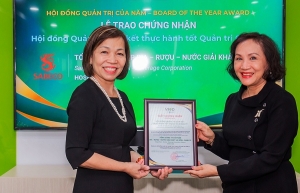Prioritising corporate governance for Vietnam’s sustainable growth
 |
| Ha Thu Thanh, chairwoman, the Vietnam Institute of Directors (VIOD) |
Vietnam’s Stock Market Development Strategy, approved under Decision No.1726/QD-TTg on December 29, 2023, outlines a clear target: raising corporate governance standards above ASEAN regional averages by 2030. This goal reflects the country’s commitment to building a robust and sustainable capital market. However, achieving this target will require a focused effort, as Vietnam’s corporate governance scores remain among the lowest in ASEAN, recording just 57.6 out of 130 points in 2022.
The 2024 evaluation of the Vietnam Listed Companies Awards (VLCA) highlights progress in corporate governance among listed companies. These improvements indicate that efforts to enhance transparency and accountability are gaining traction. However, the preliminary results of the 2024 ASEAN Corporate Governance Scorecard (ACGS) reveal that Vietnam continues to lag behind the regional average. This gap underscores the need for coordinated efforts from individual companies and the broader market to drive meaningful change.
As the technical partner for corporate governance evaluations in Vietnam for both VLCA and ACGS, the Vietnam Institute of Directors (VIOD) stresses the importance of moving beyond a compliance-only approach. Doing the minimum required by law is insufficient to meet the challenges of today’s competitive and dynamic global environment. Companies must strive for best practices as outlined in Vietnam’s Corporate Governance Code, adopting standards that go beyond compliance to ensure comprehensive and effective governance.
A fundamental starting point for advancing corporate governance lies in reshaping the mindset and understanding of corporate leaders, including board members and executives. Boards of directors have a central role to play in ensuring that corporate strategies are designed and executed with transparency, efficiency, and sustainability. This requires boards to move away from short-term thinking and focus on long-term value creation.
To achieve this shift, corporate governance and environmental, social, and governance (ESG) considerations must be embedded into companies’ annual strategies. For example, as part of their 2024–2025 development plans, companies should establish clear ESG objectives that are actively discussed and monitored at board meetings. This approach ensures that governance and sustainability become integral to decision-making processes rather than secondary concerns.
Furthermore, this commitment must extend throughout the organisation, from the board to executive management and operational teams. Consistent actions on governance and ESG issues across all levels are essential for fostering a culture of accountability and continuous improvement.
Corporate governance must evolve beyond written policies and declarations. Effective governance requires clear regulations and processes to ensure implementation. A cohesive governance structure linked to risk management is vital for ensuring accountability, transparency, and resilience.
Governance practices should be embedded at every level of management, with detailed procedures in place to identify, assess, and mitigate risks. These measures must flow from the executive level down to the operational front lines, creating an organisational culture that prioritises transparency and accountability.
Financial transparency is a particularly critical area of focus. Building investor trust and enhancing competitiveness depends on clear and reliable financial reporting. Vietnam must accelerate the adoption of International Financial Reporting Standards (IFRS) to improve the quality and consistency of financial disclosures. Additionally, integrating English-language disclosures into reporting–rather than merely translating from Vietnamese–is vital for aligning with global practices and meeting the expectations of international investors.
Achieving these ambitious governance goals requires a supportive regulatory environment and capacity-building initiatives from policymakers. Clear and consistent guidance from regulators is essential to help companies navigate the complexities of adopting international standards. In addition, corporate governance training and capacity-building programmes are critical to equipping business leaders with the knowledge and skills needed to implement best practices effectively.
Regulatory bodies also play a key role in creating an environment that incentivises adherence to high standards. For instance, recognising companies with exemplary governance practices can encourage others to follow suit. At the same time, providing technical support and resources to struggling companies can help bridge the gap between compliance and best practice.
Vietnamese companies must prioritise financial transparency as a cornerstone of their governance frameworks. Reliable financial reporting enhances investor confidence and positions companies as credible participants in the global market. The adoption of International Financial Reporting Standards, coupled with improved English-language reporting, will bring Vietnamese companies closer to international standards.
To ensure meaningful improvements in financial transparency, companies must go beyond meeting basic requirements. They should invest in technology and processes that enhance the accuracy and accessibility of financial data. Additionally, regular training for finance and accounting professionals can help maintain the quality and integrity of financial reporting.
The development of strong governance frameworks is integral to achieving Vietnam’s aspirations for sustainable growth. These frameworks must be designed to address both internal and external challenges. Internally, companies should focus on creating structures that foster accountability and efficiency. Externally, aligning with international best practices is critical for competing in a global market.
A robust governance framework should also include mechanisms for monitoring and evaluation. Boards of directors must play an active role in overseeing governance practices and ensuring alignment with organisational goals. Periodic reviews of governance policies and processes can help identify areas for improvement and ensure that companies remain responsive to changing market conditions.
VIOD, in partnership with the International Finance Corporation and the Swiss State Secretariat for Economic Affairs, is collaborating with the State Securities Commission and stock exchanges to support corporate governance reforms. These efforts include training programmes, advisory services, and capacity-building initiatives designed to help companies adopt international standards, improve governance processes, and enhance transparency.
| 44 listed companies in Vietnam excelling in information transparency for 2024 will be honoured at the 17th annual Vietnam Listed Companies Awards (VLCA) ceremony, set to take place at the Merperle Dalat Hotel on November 16, 2024. The VLCA, an extension of the Vietnam Annual Report Awards, is co-hosted by the Ho Chi Minh City Stock Exchange, Hanoi Stock Exchange, and VIR, with exclusive sponsorship from Dragon Capital. Supported by professional partners like ACCA, VIOD, IFC, and leading audit firms PwC, Deloitte, KPMG, and EY, along with information from the State Securities Commission and both stock exchanges, VLCA 2024 results affirm the evaluation's accuracy and objectivity. Now in its 17th year, VLCA continues to support Vietnam’s stock market and listed company community. |
(*) Ha Thu Thanh, chairwoman, the Vietnam Institute of Directors (VIOD)
 | Hanoi to host forum on corporate governance The 2023 Corporate Governance Forum on November 22 will feature the participation of representatives from banks, publicly listed companies, and associations. |
 | SABECO receives VIOD certificate for corporate governance best practices Saigon Beer - Alcohol - Beverage Corporation (SABECO) has been honoured as having a Board of Directors that is committed to corporate governance best practices by the Vietnam Institute of Directors (VIOD). |
 | Vietnam Wafer bolsters corporate governance and sets strategic course for growth Vietnam Wafer JSC approved critical corporate governance enhancements, appointed a new chairman, and outlined a strategic roadmap at its second general shareholders' meeting (GSM) on September 7, reinforcing its commitment to sustainable growth and market leadership in the semiconductor industry. |
 | Corporate governance foundation for sustainable development goals Corporate governance is increasingly recognised as the cornerstone for achieving sustainable development goals, particularly amid the challenges posed by political instability, geopolitical tensions, climate change, and rapid technological advancements. |
What the stars mean:
★ Poor ★ ★ Promising ★★★ Good ★★★★ Very good ★★★★★ Exceptional
Related Contents
Latest News
More News
- Private capital funds as cornerstone of IFC plans (February 20, 2026 | 14:38)
- Priorities for building credibility and momentum within Vietnamese IFCs (February 20, 2026 | 14:29)
- How Hong Kong can bridge critical financial centre gaps (February 20, 2026 | 14:22)
- All global experiences useful for Vietnam’s international financial hub (February 20, 2026 | 14:16)
- Raised ties reaffirm strategic trust (February 20, 2026 | 14:06)
- Sustained growth can translate into income gains (February 19, 2026 | 18:55)
- The vision to maintain a stable monetary policy (February 19, 2026 | 08:50)
- Banking sector faces data governance hurdles in AI transition (February 19, 2026 | 08:00)
- AI leading to shift in banking roles (February 18, 2026 | 19:54)
- Digital banking enters season of transformation (February 16, 2026 | 09:00)

 Tag:
Tag:



















 Mobile Version
Mobile Version